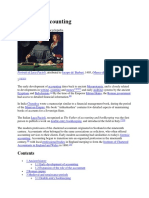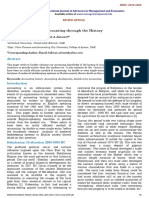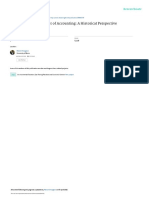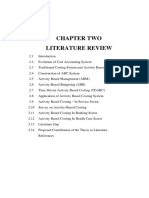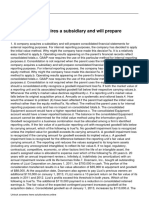0 ratings0% found this document useful (0 votes)
31 viewsEarly Development of Accounting
Early Development of Accounting
Uploaded by
SakshiEarly accounting records dating back over 7,000 years have been found in Mesopotamia showing lists of expenditures and goods traded, related to taxation and trading activities of temples. Key early developments included counting, writing, money, and accounting emerging together in Mesopotamian temple economies. Later Phoenicians invented an alphabet for bookkeeping, while Egyptians had auditing systems and the importance of taxation led to payment recording. Double-entry bookkeeping developed in the medieval period, improving inheritance accounting required by Islamic law. Modern accounting professionalized in the 19th-20th centuries building on the double-entry system and earlier associations of accountants and solicitors.
Copyright:
© All Rights Reserved
Available Formats
Download as DOCX, PDF, TXT or read online from Scribd
Early Development of Accounting
Early Development of Accounting
Uploaded by
Sakshi0 ratings0% found this document useful (0 votes)
31 views4 pagesEarly accounting records dating back over 7,000 years have been found in Mesopotamia showing lists of expenditures and goods traded, related to taxation and trading activities of temples. Key early developments included counting, writing, money, and accounting emerging together in Mesopotamian temple economies. Later Phoenicians invented an alphabet for bookkeeping, while Egyptians had auditing systems and the importance of taxation led to payment recording. Double-entry bookkeeping developed in the medieval period, improving inheritance accounting required by Islamic law. Modern accounting professionalized in the 19th-20th centuries building on the double-entry system and earlier associations of accountants and solicitors.
Original Title
Early development of accounting
Copyright
© © All Rights Reserved
Available Formats
DOCX, PDF, TXT or read online from Scribd
Share this document
Did you find this document useful?
Is this content inappropriate?
Early accounting records dating back over 7,000 years have been found in Mesopotamia showing lists of expenditures and goods traded, related to taxation and trading activities of temples. Key early developments included counting, writing, money, and accounting emerging together in Mesopotamian temple economies. Later Phoenicians invented an alphabet for bookkeeping, while Egyptians had auditing systems and the importance of taxation led to payment recording. Double-entry bookkeeping developed in the medieval period, improving inheritance accounting required by Islamic law. Modern accounting professionalized in the 19th-20th centuries building on the double-entry system and earlier associations of accountants and solicitors.
Copyright:
© All Rights Reserved
Available Formats
Download as DOCX, PDF, TXT or read online from Scribd
Download as docx, pdf, or txt
0 ratings0% found this document useful (0 votes)
31 views4 pagesEarly Development of Accounting
Early Development of Accounting
Uploaded by
SakshiEarly accounting records dating back over 7,000 years have been found in Mesopotamia showing lists of expenditures and goods traded, related to taxation and trading activities of temples. Key early developments included counting, writing, money, and accounting emerging together in Mesopotamian temple economies. Later Phoenicians invented an alphabet for bookkeeping, while Egyptians had auditing systems and the importance of taxation led to payment recording. Double-entry bookkeeping developed in the medieval period, improving inheritance accounting required by Islamic law. Modern accounting professionalized in the 19th-20th centuries building on the double-entry system and earlier associations of accountants and solicitors.
Copyright:
© All Rights Reserved
Available Formats
Download as DOCX, PDF, TXT or read online from Scribd
Download as docx, pdf, or txt
You are on page 1of 4
Early development of accounting[edit]
See also: History of mathematics, History of writing,
and History of money
Accounting records dating back more than 7,000 years
have been found in Mesopotamia,[11] and documents from
ancient Mesopotamia show lists of expenditures,
and goods received and traded.[1] The development of
accounting, along with that of money and numbers, may
be related to the taxation and trading activities of temples:
"another part of the explanation as to why accounting
employs the numerical metaphor is [...] that money,
numbers and accounting are interrelated and, perhaps,
inseparable in their origins: all emerged in the context of
controlling goods, stocks and transactions in the temple
economy of Mesopotamia."[1]
The early development of accounting was closely related
to developments in writing, counting, and money. In
particular, there is evidence that a key step in the
development of counting—the transition from concrete
to abstract counting—was related to the early
development of accounting and money and took place in
Mesopotamia[1]
Other early accounting records were also found in the
ruins of ancient Babylon, Assyria and Sumer, which date
back more than 7,000 years. The people of that time relied
on primitive accounting methods to record the growth of
crops and herds. Because there was a natural season to
farming and herding, it was easy to count and determine if
a surplus had been gained after the crops had been
harvested or the young animals weaned.[11]
Expansion of the role of the accountant[edit]
Between the 4th millennium BC and the 3rd millennium BC, the
ruling leaders and priests in ancient Iran had people oversee
financial matters. In Godin Tepe ( )گدین تپهand Tepe Yahya ( تپه
)يحيی, cylindrical tokens that were used for bookkeeping on clay
scripts were found in buildings that had large rooms for storage of
crops. In Godin Tepe's findings, the scripts only contained tables
with figures, while in Tepe Yahya's findings, the scripts also
contained graphical representations.[4] The invention of a form
of bookkeeping using clay tokens represented a
huge cognitive leap for mankind.[5]
During the 2nd millennium BC,[12] the expansion of commerce and
business expanded the role of the accountant.
The Phoenicians invented a phonetic alphabet "probably for
bookkeeping purposes", based on the Egyptian hieratic script,
and there is evidence that an individual in ancient Egypt held the
title "comptroller of the scribes". There is also evidence for an
early form of accounting in the Old Testament; for example
the Book of Exodus describes Moses engaging Ithamar to
account for the materials that had been contributed towards the
building of the tabernacle.[2]
By about the 4th century BC, the ancient Egyptians and
Babylonians had auditing systems for checking movement in and
out of storehouses, including oral "audit reports", resulting in the
term "auditor" (from audire, to hear in Latin). The importance of
taxation had created a need for the recording of payments, and
the Rosetta Stone also includes a description of a tax revolt.[2]
Medieval and renaissance periods[edit]
Double-entry bookkeeping[edit]
Main articles: Luca Pacioli and Double-entry bookkeeping
system
In eighth century Persia, scholars were confronted with the
Qur’an's requirement that Muslims keep records of their
indebtedness as a part of their obligation to account to
God on all matters of their life. This became particularly
difficult when it came to inheritance, which demanded
detailed accounting for the estate after death of an
individual. The assets remaining after the payment of
funeral expenses and debts were allocated to every
member of the family in fixed shares, and included wives,
children, fathers and mothers. This required extensive use
of ratios, multiplication and division that depended on the
mathematics of Hindu-Arabic numerals.
Modern professional accounting[edit]
Modern Accounting is a product of
centuries of thought, custom, habit, action
and convention. Two concepts have formed
the current state of the accountancy
profession. Firstly, the development of the
double-entry book-keeping system in the
fourteenth and fifteenth century and
secondly, accountancy professionalization
which was created in the nineteenth and
twentieth centuries.[40] The modern
profession of the chartered accountant
originated in Scotland in the nineteenth
century. During this time, accountants often
belonged to the same associations
as solicitors, and the latter solicitors
sometimes offered accounting services to
their clients. Early modern accounting had
similarities to today's forensic accounting:[41]
You might also like
- Rakesh Kishor Kapoor LmiaDocument3 pagesRakesh Kishor Kapoor LmiaBALACHANDRA BHAT92% (13)
- Vdocuments - MX - Ven Te Chow Solutions Manual Channel Hydraulics Chow Solution Manual HandbookDocument5 pagesVdocuments - MX - Ven Te Chow Solutions Manual Channel Hydraulics Chow Solution Manual Handbookjhoan peñaranda40% (5)
- Ranmj 05Document44 pagesRanmj 05itamarmarvitNo ratings yet
- A Brief History of AccountingDocument3 pagesA Brief History of AccountingRae Michael83% (6)
- History of BankingDocument24 pagesHistory of BankingAvtar SinghNo ratings yet
- Corporate Governance at BMWDocument2 pagesCorporate Governance at BMWSandeep ChauhanNo ratings yet
- Text 2Document1 pageText 27ynntzww76No ratings yet
- History of AccountingDocument11 pagesHistory of Accountingulum100% (1)
- History of AccountingDocument8 pagesHistory of Accountingbea bagsaoNo ratings yet
- Early Development of Accounting: History of Mathematics History of Writing History of MoneyDocument1 pageEarly Development of Accounting: History of Mathematics History of Writing History of MoneyJustine Airra OndoyNo ratings yet
- History of AccountingDocument5 pagesHistory of AccountingRonaldNo ratings yet
- History of AccountingDocument6 pagesHistory of AccountingLai Kee Kong100% (1)
- History of Acctg. - 021249Document7 pagesHistory of Acctg. - 021249altheanicoleraquipo221No ratings yet
- History of accounting - WikipediaDocument18 pagesHistory of accounting - WikipediaAnna BalgonaNo ratings yet
- Historical Overview of Accounting Information SystemsDocument19 pagesHistorical Overview of Accounting Information SystemsAthiya PutriNo ratings yet
- 201 History and Development of AccountingDocument3 pages201 History and Development of Accountingoluwatimileyinjoshua88No ratings yet
- A Brief History of AccountingDocument8 pagesA Brief History of AccountingRic John Naquila CabilanNo ratings yet
- Assignment For History of AccountingDocument3 pagesAssignment For History of AccountingWaleed KhanNo ratings yet
- Lecture 1 - History of AccountingDocument30 pagesLecture 1 - History of AccountingFreya LeeNo ratings yet
- The History and The Definition of AccountingDocument8 pagesThe History and The Definition of AccountingAnonymous IL2FseNo ratings yet
- Acconting History (Definition and Relevance by Ama Ogbonnaya KaluDocument13 pagesAcconting History (Definition and Relevance by Ama Ogbonnaya KaluNewman Enyioko100% (1)
- Chapter 1Document41 pagesChapter 1Eka Nor SyafaatNo ratings yet
- Brief History of AccountingDocument2 pagesBrief History of AccountingShane PetrasNo ratings yet
- History of Accounting-WPS OfficeDocument10 pagesHistory of Accounting-WPS OfficeLea PasquinNo ratings yet
- FABM - PrelimsDocument8 pagesFABM - PrelimsGhesca Mae FernandezNo ratings yet
- Origin of Accounting in Ancient AgeDocument22 pagesOrigin of Accounting in Ancient AgeScribdTranslationsNo ratings yet
- Expose 1Document4 pagesExpose 1feriel0805zNo ratings yet
- History of AccountingDocument34 pagesHistory of AccountingWaqar AhmadNo ratings yet
- History of BankDocument56 pagesHistory of BankJayshree ThakkarNo ratings yet
- History and Development of AccountingDocument5 pagesHistory and Development of AccountingLeonilaEnriquez100% (1)
- ACC 101 Week Two 2023 2024 18 January 2024Document26 pagesACC 101 Week Two 2023 2024 18 January 2024mojeedsodiq0No ratings yet
- Jake Eeeeeeeeeeeeeee EeeDocument3 pagesJake Eeeeeeeeeeeeeee EeeJake Realzon RuazolNo ratings yet
- 01. History_of_bankingDocument34 pages01. History_of_bankingpaxdusunicaNo ratings yet
- Luca Pacioli Double-Entry Bookkeeping SystemDocument2 pagesLuca Pacioli Double-Entry Bookkeeping SystemJustine Airra OndoyNo ratings yet
- Who Was The First Accountant PDFDocument11 pagesWho Was The First Accountant PDFShahzad AsifNo ratings yet
- Wiki History of BankingDocument34 pagesWiki History of BankingRaff, NLP-HealthNo ratings yet
- Chapter 1 - Introduction To Accounting History of AccountingDocument1 pageChapter 1 - Introduction To Accounting History of AccountingEduard Phil OrilloNo ratings yet
- ConceptualDevelopmentofAccounting AHistoricalDocument11 pagesConceptualDevelopmentofAccounting AHistoricaldrghada8181No ratings yet
- Part 1 Chapter 1 Introduction - BKAR3053Document13 pagesPart 1 Chapter 1 Introduction - BKAR3053Ain Yusnizai Mat YuninNo ratings yet
- Accounting in MesopotamiaDocument5 pagesAccounting in MesopotamiaEleni MulualemNo ratings yet
- Group WorkDocument3 pagesGroup WorkMassawe Michael BarakaNo ratings yet
- The Development of Accounting Through The History: Mohamud Ambashe, Hikmat A AlrawiDocument6 pagesThe Development of Accounting Through The History: Mohamud Ambashe, Hikmat A AlrawiRahimah ARNo ratings yet
- History of AccountingDocument1 pageHistory of AccountingMaika J. PudaderaNo ratings yet
- BHT 1Document44 pagesBHT 1Onkar ChavanNo ratings yet
- The Concept of CurrencyDocument2 pagesThe Concept of CurrencyChelsea EspirituNo ratings yet
- Accountancy Is The Process of Communicating Financial Information About ADocument9 pagesAccountancy Is The Process of Communicating Financial Information About AZahirah EiraNo ratings yet
- Conceptual Development of Accounting: A Historical PerspectiveDocument11 pagesConceptual Development of Accounting: A Historical PerspectiveVeres IzabelaNo ratings yet
- History of AccountingDocument1 pageHistory of AccountinghcimtdNo ratings yet
- History of Bookkeeping and Accounting: The Ancient World Medieval Developments Industrial RevolutionDocument62 pagesHistory of Bookkeeping and Accounting: The Ancient World Medieval Developments Industrial RevolutionDenmarc LabongrayNo ratings yet
- History of Banking - WikipediaDocument62 pagesHistory of Banking - WikipediaOkunlola JoshuaNo ratings yet
- Origin and Evolution or History of AccountingDocument4 pagesOrigin and Evolution or History of AccountingJayson Benjamin RodriguezNo ratings yet
- A Brief History of AccountingDocument5 pagesA Brief History of AccountingYzzabel Denise L. TolentinoNo ratings yet
- An Overview: History of AccountingDocument4 pagesAn Overview: History of AccountingKathlyn LabetaNo ratings yet
- Luca Pacioli Ancient and Medieval: Introduction: Why Study Accounting History?Document11 pagesLuca Pacioli Ancient and Medieval: Introduction: Why Study Accounting History?Rajipah OsmanNo ratings yet
- The History of AccountingDocument2 pagesThe History of AccountingNowshin Sharmily NitaNo ratings yet
- FABM1 Lesson1-4 History of AccountingDocument12 pagesFABM1 Lesson1-4 History of AccountingThe TricksterNo ratings yet
- Definition and Nature of AccountingDocument16 pagesDefinition and Nature of Accountingdd8w252dfgNo ratings yet
- Cbse 11 History Notes ch02 PDFDocument6 pagesCbse 11 History Notes ch02 PDFkshiti100% (1)
- Historical Development of AccountingDocument25 pagesHistorical Development of AccountingstrifehartNo ratings yet
- Verification: Learn How and When To Remove This Template MessageDocument2 pagesVerification: Learn How and When To Remove This Template MessageGers VenturaNo ratings yet
- 12 - Chapter TwoDocument83 pages12 - Chapter TwoMULU TEMESGENNo ratings yet
- Week 1 FABM 1 CheckedDocument49 pagesWeek 1 FABM 1 CheckedJackelyn Carelo ManzaneroNo ratings yet
- Labor in the Early States—an Early Mesopotamian Perspective ; Piotr Steinkeller , Harvard UniversityDocument140 pagesLabor in the Early States—an Early Mesopotamian Perspective ; Piotr Steinkeller , Harvard UniversityChristopher Vanderwall-BrownNo ratings yet
- Comprehensive World History: A Complete Reference Book for CLASS XIFrom EverandComprehensive World History: A Complete Reference Book for CLASS XINo ratings yet
- Pre-Board I PDF - Class X EnglishDocument2 pagesPre-Board I PDF - Class X EnglishSakshiNo ratings yet
- Lacal Ahpas Enmant Whi: KH Has Ka OnitiadaDocument2 pagesLacal Ahpas Enmant Whi: KH Has Ka OnitiadaSakshiNo ratings yet
- Art Integration Project: Growth and Development in GujaratDocument15 pagesArt Integration Project: Growth and Development in GujaratSakshi0% (1)
- 406 MS Introduction To TourismDocument9 pages406 MS Introduction To TourismSakshiNo ratings yet
- 3.ASSIGNMENT SHEET (Teori Packaging) - FinalDocument7 pages3.ASSIGNMENT SHEET (Teori Packaging) - FinalquensheilaNo ratings yet
- Hotel Case Study - ExamDocument10 pagesHotel Case Study - ExamDaniel ValenciaNo ratings yet
- Chapter 3 Problem I - Cost MethodDocument5 pagesChapter 3 Problem I - Cost MethodJIL Masapang Victoria ChapterNo ratings yet
- Nader Asfour 01-2022Document2 pagesNader Asfour 01-2022SAlmaa NANo ratings yet
- 【雅思写作】剑桥真题17个高分句型(精选)Document8 pages【雅思写作】剑桥真题17个高分句型(精选)Mary WongNo ratings yet
- Cost Estimation: AACSB: AnalyticDocument30 pagesCost Estimation: AACSB: AnalyticMaryane AngelaNo ratings yet
- Sponsorship Success - Creating Lasting Partnerships - Materials 1Document35 pagesSponsorship Success - Creating Lasting Partnerships - Materials 1Kaori NusantaraNo ratings yet
- Entrep Chap 5Document11 pagesEntrep Chap 5kyla villarealNo ratings yet
- BHEL Report On Transformer.f (PDF) .Final1Document45 pagesBHEL Report On Transformer.f (PDF) .Final1Ankita100% (1)
- Bill of Lading Xls DataDocument2 pagesBill of Lading Xls DataimportNo ratings yet
- Med-Lx9 Eu Doc (Red - NB) 4.0 (Multilingual) (20210413)Document30 pagesMed-Lx9 Eu Doc (Red - NB) 4.0 (Multilingual) (20210413)Armando Maldonado SanchezNo ratings yet
- Assignment 4 Rafia Syed (17483)Document2 pagesAssignment 4 Rafia Syed (17483)Rafia SyedNo ratings yet
- GoPro Case StudyDocument15 pagesGoPro Case StudyShubham SaxenaNo ratings yet
- All Certified Equipment Trading Corp.-National Highway, Cauayan Isabela 3305 PhilippinesDocument1 pageAll Certified Equipment Trading Corp.-National Highway, Cauayan Isabela 3305 PhilippinesMauza ZuanNo ratings yet
- Mau Van Don Hang Khong Airway Bill Awb Nhap Khau Tu SingaporeDocument1 pageMau Van Don Hang Khong Airway Bill Awb Nhap Khau Tu SingaporetroancuteNo ratings yet
- 1 A Company Acquires A Subsidiary and Will Prepare ConsolidatedDocument1 page1 A Company Acquires A Subsidiary and Will Prepare Consolidatedtrilocksp SinghNo ratings yet
- CRM ch-3Document19 pagesCRM ch-3dagahimanshu84No ratings yet
- Ethics Assign.Document3 pagesEthics Assign.Yeonnie KimNo ratings yet
- Template With Header Business PlanDocument25 pagesTemplate With Header Business Planjohn carlosNo ratings yet
- Entrep 12 Marketing MixDocument14 pagesEntrep 12 Marketing MixZyrichNo ratings yet
- Levers Influencing Sustainable Waste RecoveryDocument8 pagesLevers Influencing Sustainable Waste Recoveryrobiah khoirNo ratings yet
- 1990 Mercedes-Benz G Class For Sale For 13995 in Wolverhampton, StaffordshireDocument1 page1990 Mercedes-Benz G Class For Sale For 13995 in Wolverhampton, StaffordshireOliver BrazierNo ratings yet
- 如何撰寫文章摘要Document5 pages如何撰寫文章摘要cjbyd3tkNo ratings yet
- Toolkit Materiality Assessment 2022 - FINALDocument36 pagesToolkit Materiality Assessment 2022 - FINALtrader123No ratings yet
- Iata Accounting and Prefix Code RequirementsDocument2 pagesIata Accounting and Prefix Code RequirementsHASSNo ratings yet
- Inventories: P15,000 Capitalization Threshold For PPEDocument6 pagesInventories: P15,000 Capitalization Threshold For PPESusan TalaberaNo ratings yet








